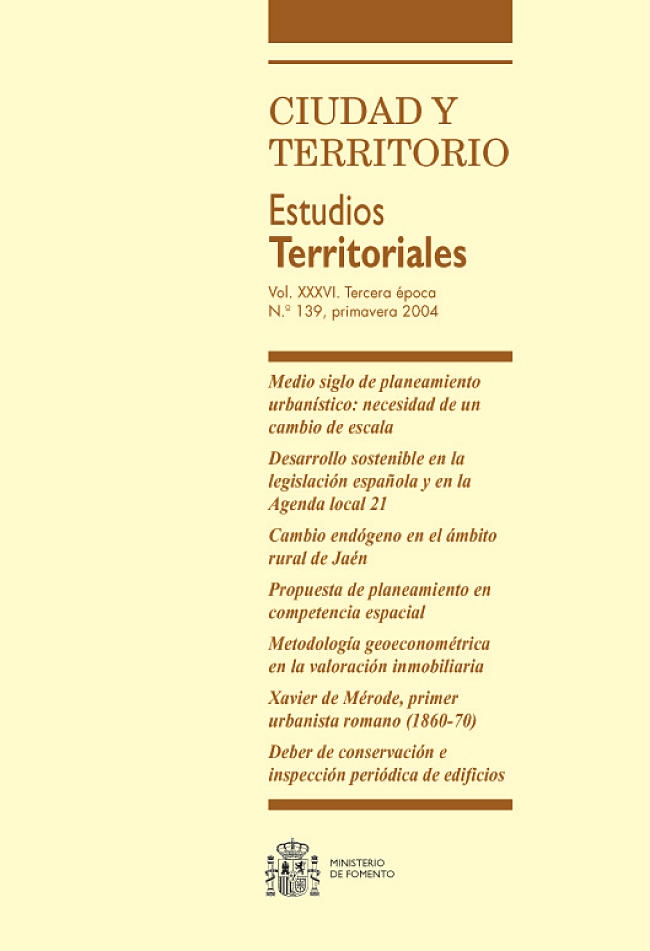As to Open Competitive Tendering as within Planning: theory and Application of this to Town Planning
Keywords:
Ordenación del territorio, planeamiento municipal, liberalización del suelo, concursos públicos, legislación urbanística, Ley Reguladora de la Actividad UrbanísticaAbstract
The author affirms that Open Competitive Tendering during any Planning Process could well be
understood as that which seeks to further the attaining of city and territory planning goals on the part of
the different administrations enjoying territorial, urban or other jurisdiction, by means of calling for open
tendering. This, in turn, is here felt to better the chance of the different agents involved in the achieving
of a germain classification of sought after land and to make the most of existing underpinning
infrastructures such as the underground or suburban railway network prior to any corresponding plan’s
being definitively approved. The process is made possible by a defining of units for competition which take
into objective consideration the existence of non-developable land (land with a high enviromental rating,,
dangerously unsuitable due to natural causes etc) and into account the economic viability of the
conflicting alternatives the same offers along with the overall rationale and coherence of the entire
territory. While following the basic lines as set out in Law 6/1994, of November 15, as to the Regulation of
City and Territorial Planning as within the Autonomous Community of Valencia, it broadens the scope of
the same, differing for example from the Valencian Act in that within competitive territorial planning,
open tendering not only establishes the builder, but also the land that is to be developed along with the
designing of structural infrastructures and major services.
Downloads
Downloads
Published
How to Cite
Issue
Section
License
Copyright (c) 2004 Fernando Moliní

This work is licensed under a Creative Commons Attribution-NonCommercial-NoDerivatives 4.0 International License.
Considering the provisions of the current legislation on Intellectual Property, and in accordance with them, all authors publishing in CyTET give -in a non-exclusive way and without time limit- to the Ministry of Transport, Mobility and Urban Agenda the rights to disseminate, reproduce, communicate and distribute in any current or future format, on paper or electronic, the original or derived version of their work under a Creative Commons Attribution-NonCommercial-NoDerivative 4.0 license International (CC BY-NC-ND 4.0), as well as to include or assign to third parties the inclusion of its content in national and international indexes, repositories and databases, with reference and recognition in any case of its authorship.
In addition, when sending the work, the author(s) declares that it is an original work in which the sources that have been used are recognized, committing to respect the scientific evidence, to no longer modify the original data and to verify or refute its hypothesis. Author(s) also declare that the essential content of the work has not been previously published nor will it be published in any other publication while it is under evaluation by CyTET; and that it has not been simultaneously sent to another journal.
Authors must sign a Transfer of Rights Form, which will be sent to them from the CyTET Secretariat once the article is accepted for publication.
With the aim of promoting the dissemination of knowledge, CyTET joins the Open Journal Access (OA) movement and delivers all of its content to various national and international indexes, repositories and databases under this protocol; therefore, the submission of a work to be published in the journal presupposes the explicit acceptance by the author of this distribution method.
Authors are encouraged to reproduce and host their work published in CyTET in institutional repositories, web pages, etc. with the intention of contributing to the improvement of the transfer of knowledge and the citation of said works.








 Enlace a CyTET en Linkedin
Enlace a CyTET en Linkedin